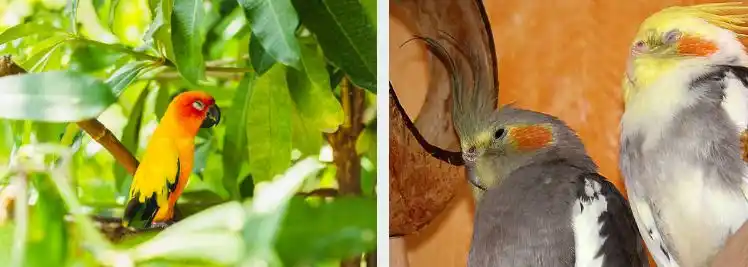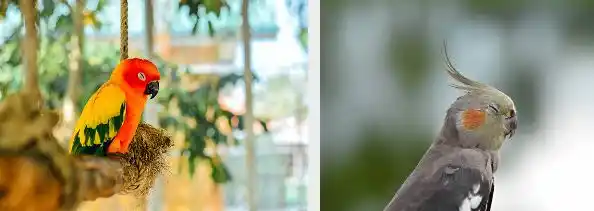Parrots are fascinating and intelligent animals that can make great companions for humans. However, they also have specific needs and preferences that must be met to ensure their well-being and happiness. One of these needs is sleep. How many hours a day do Parrot Sleep? And how can you provide them with a suitable environment for sleeping? In this article, we will answer these questions and more.
The Importance of Parrot Sleep

Sleep is essential for all animals, including parrots. Sleep has many benefits for parrots, such as:
- Memory recall: During sleep, parrots consolidate new memories and learn new skills. This is especially important for young parrots that need to develop their cognitive abilities and survival instincts.
- Cognitive performance: Sleep also enhances the mental and physical performance of parrots. A study by Nature found that sleep deprivation in birds makes them clumsy at cognitive tasks and diminishes the quality of their singing and talking.
- Immune health: Sleep supports the immune system of parrots and helps them fight off infections and diseases. Parrots that do not get enough sleep may be more prone to illnesses such as respiratory infections, psittacine beak and feather disease (PBFD), and psittacosis.
- Behavior: Sleep also affects the mood and temperament of parrots. Parrots that do not get enough sleep may become more aggressive, noisy, and destructive. They may also exhibit signs of stress and anxiety, such as feather plucking, biting, and screaming.
How Many Hours Do Parrots Need to Sleep?

The amount of sleep that parrots need depends on several factors, such as their species, age, and environment. However, a general rule of thumb is that most parrots need between 10 to 12 hours of sleep per day.
Find here different types of parrots sleeping habits.
- Tropical or subtropical parrots: These are parrots that originate from regions near the equator, such as South America and Africa. Examples include African greys, sun parakeets, macaws, and amazons. These parrots are used to having 12 hours of light and 12 hours of darkness in their natural habitat. Therefore, they need about 10 to 12 hours of sleep per night.
- Temperate parrots: These are parrots that originate from regions that have more variation in day length, such as Australia and Asia. Examples include budgies, cockatiels, lovebirds, and parrotlets. These parrots are more adaptable to changing seasons and daylight hours. Therefore, they may need less sleep in the summer (8 hours) and more sleep in the winter (12–14 hours).
- Baby parrots: These are parrots that are still growing and developing. They need more sleep than adult parrots to support their growth and learning. Baby parrots may need up to 16 hours of sleep per day, depending on their species and individual needs.
How to Provide a Good Sleeping Environment for Parrots

To ensure that your parrot gets enough quality sleep, you need to provide them with a suitable sleeping environment. Here are some tips to follow:
- Provide a dark, quiet place to sleep: Parrots need darkness and quiet to sleep well. Artificial lights, noises, or movements in their surroundings may disturb them. Therefore, you should provide them with a separate sleep cage or a dark corner of their main cage. You can also cover their cage partially or completely with a cloth or a cage cover to block out any light or noise. However, make sure that the cover is breathable and does not restrict the air flow or the temperature inside the cage.
- Keep a regular sleep schedule: Parrots are creatures of habit and they like to have a consistent routine. You should try to put your parrot to bed and wake them up at the same time every day. This will help them adjust their biological clock and sleep better. You can also use cues such as dimming the lights, lowering the volume, or playing soothing music to signal that it is time for bed.
- Avoid disturbing your parrot during sleep: Parrots are very sensitive, and they may wake up easily if they sense any disturbance. You should avoid making any loud noises, turning on the lights, or touching your parrot while they are sleeping. If you need to check on your parrot, do it gently and quietly. If your parrot wakes up, do not interact with them or encourage them to stay awake. Let them go back to sleep as soon as possible.
- Limit access to light during hormonal seasons: Parrots may become more hormonal and aggressive during certain times of the year, such as spring or summer. This is because the longer daylight hours stimulate their reproductive hormones and trigger their mating behavior. To reduce this effect, you can limit the access to light to 8 to 10 hours per day for your parrot. This will help them calm down and sleep better. However, this is a temporary measure and you should consult your vet before making any changes to your parrot’s light exposure.

Conclusion
Sleep is vital for the health and happiness of parrots. Parrots need different amounts of sleep depending on their species, age, and environment. However, most parrots need between 10 and 12 hours of sleep per day. To provide your parrot with a good sleeping environment, you should follow the tips mentioned above. By doing so, you will help your parrot sleep better and enjoy a more fulfilling life with you.





Leave a Comment
You must be logged in to post a comment.